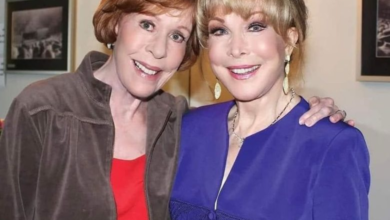The doctors allowed the dog to enter the room to say goodbye to his owner – a few hours later, the nurse walked in and screamed in horror

The hospital room was quiet and dim, lit only by the soft glow of monitors and the fading rhythm of a heart—steady, then slowing, then slipping away. In the bed lay an 82-year-old man, his breathing thin, his skin delicate as paper. The cancer had spread too far. Treatment was over. The doctors said he had hours, maybe a day.
But what weighed on him wasn’t death. It was the thought of leaving behind the one soul who had never left him.
Every morning, while the nurse adjusted his IV or straightened the sheets, he would glance toward the window and murmur, “Ritchie… where are you, boy?”
Ritchie was his dog—a scruffy, aging mutt with more gray than brown left in his fur. Fifteen years earlier, the man had found him shivering by the roadside and taken him home. They’d been inseparable ever since. Together, they’d buried a wife, mourned a son, and outlived nearly everyone they loved. Ritchie had become his shadow, his comfort, his reason to get up each day.
That afternoon, when the nurse stepped in to check his vitals, he clutched her wrist with unexpected strength. “Please,” he whispered, eyes shining. “I need to see Ritchie. I can’t leave without saying goodbye.”
She hesitated. Animals weren’t allowed—policy, infection control, rules carved in stone. But something in his voice cracked her resolve.
“I’ll try,” she said gently.
When she approached the head physician, he stared at her like she’d lost her senses. “You know the rules,” he said. Then after a long, thoughtful pause, he sighed. “But… if it’s truly his last request, maybe we bend them. Just this once.”
Two hours later, a bark echoed down the hallway. Nurses stopped mid-stride. A thin dog with a graying muzzle stood at the doorway, tail wagging weakly, scanning the room until his eyes landed on the man.
The nurse opened the door. Ritchie trotted inside, paying no mind to anyone else. He climbed onto the bed with careful steps, avoiding the wires and tubes, and curled against his human.
“My boy,” the man whispered, threading trembling fingers through the familiar fur. “You made it.”
Ritchie pressed his head to the man’s chest, aligning his breathing with the fading heartbeat beneath. Tears slid down the man’s cheeks as he stroked him. “I’m sorry,” he murmured. “I wasn’t always enough. But thank you… for staying.”
The dog let out a soft whimper, as if answering, “I know.”
The nurse slipped out, giving them privacy. For the first time in days, the man’s face softened.
Hours passed. When she peeked in again, they were still curled together—Ritchie’s head resting on the man’s shoulder, their chests rising and falling in quiet sync. She smiled and closed the door.
By evening, the room had gone silent. Too silent.
The monitor was flat.
“Sir?” she whispered as she stepped closer. But then she saw it.
Ritchie hadn’t moved. He lay across the man’s chest, nose tucked against his neck, eyes closed. She checked for a pulse. There was none.
The man had slipped away peacefully in his sleep—and the dog’s heart, it seemed, had simply followed.
She gasped, hand over her mouth. Staff rushed in. Even the physician who’d questioned the visit paused in the doorway, stunned.
There was no medical reason. Ritchie hadn’t been ill. No signs of distress. It was as though he simply chose not to stay behind. Some said his heart broke. Others said he followed by choice.
They didn’t separate them right away. They left them as they were—man and dog, still bound by a love that refused to end.
When the man’s family came to collect his belongings, they found a note in his drawer—just a few shaky lines:
“If I go before Ritchie, please make sure he’s safe. He’s my family. He deserves kindness.
If he goes before me, tell him I’ll find him again.”
He hadn’t needed to wait long.
Word of what happened spread through the hospital in the days that followed. Some called it coincidence. Others called it fate. But everyone who had witnessed that moment said they’d never forget the sight of the two of them—peaceful, together, unbroken.
The nurse received a gentle reprimand. No punishment. The head physician simply said, “You did the right thing.” And every member of the staff agreed.
Sometimes compassion means bending the rules. Sometimes the deepest mercy isn’t in medicine but in letting connections—pure, simple, loyal—have their final moment.
For weeks afterward, the nurse thought about Ritchie. About how love, once given wholeheartedly, doesn’t die with breath. It lingers. It follows.
In the end, the old man didn’t die alone. And his loyal dog didn’t have to live alone. They left this world the same way they’d walked through it for fifteen years—side by side, steady and devoted.
And although the bed was cleared and the room filled again with footsteps and machinery, those who worked there swore it felt different—softer, warmer, touched by the quiet echo of two hearts that refused to part.



